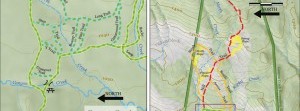
Photo Credit: Photo Thom Henley
Meeting Mountains: Kitwanga wilderness camp hosts international students
What does a teenager from India have in common with a teenager from Peru or a First Nations youth from northern British Columbia?
If they are participants in an international program this July based out of the Soaring Spirits Camp at Kitwanga, they will share laughter, mosquitoes, sweat and fatigue as they construct a three-kilometre trail within Kitwanga Mountain Provincial Park. For many of these students, it will be their first chance to meet a mountain face-to-face.
Canada seems an unlikely choice to be targeted for free service work by overseas students, but the Round Square International Schools program, with participating high school level students from countries as diverse as Sri Lanka, Oman, Australia and Germany, undertook its first Canadian project in 2012 at Soaring Spirits Camp. Wishing to expose students to environmental and community issues found within remote regions located in so-called First World countries, the program chose northwestern British Columbia.
According to Thom Henley, a 30-year expert in international outdoor education and director of the Soaring Spirits Camp, programs such as Round Square are part of the rapidly growing list of Soaring Spirits Camp’s international participants. Established in 2007, with the land donated by Henley to Rediscovery International as a training centre, Soaring Spirits Camp is making a difference as both a regional facility and international location where youth can meet the natural world and First Nations cultures.
“No sooner had I purchased the 175-acre Soaring Spirits Camp property along the Skeena River than I willed it to the Rediscovery International Foundation to forever be a place where youth from all countries and cultures could come together to discover the world within themselves, the cultural worlds between them and the natural world around them,” Henley says.
“In a very short span of time, this camp that is solar powered and largely self sufficient with organic fruits and vegetables has captured a lot of people’s attention.”
With its spectacular views of the Seven Sisters, wildflower meadows, wildlife and organic gardens, Soaring Spirits Camp has quickly become a centre for youth training, elder gatherings, wellness workshops and other events that connect people to wilderness and traditional knowledge.
In addition to spectacular mountains and wildlife, the rich cultures of the region’s First Nations, and their thousands of years of traditional ecological stewardship, were good fits to the ideals of the Round Square program.
Named after the central square of a historic doughnut-shaped building at Gordonstoun School in Scotland, the initial concept of this international schools program began in 1920 in Germany through the efforts of an innovative educator, Kurt Hahn. A Round Square student receives an education based on six ideals: internationalism, democracy, environment, adventure, leadership and service. These ideals are taught through a rigorous program of in-class and extra-curricular activities.
As part of their educational development, each student participates in international service projects designed to teach the skills of working in groups and coping with stressful conditions and new cultures. These projects are sponsored by donations and developed in cooperation with NGOs and local organizations.
The product of each service project is a gift to the country or region in which it is undertaken. Projects can range from trail building within national parks to environmental restoration, water systems, community buildings and schools. Deliberately chosen to be physically and mentally challenging, the international service projects build a student’s compassion and understanding for other people and other countries.
According to Henley, students at the three-week 2012 Round Square Canadian service program were amongst the finest young people with which he had worked in his many years of international education programs. Participants included 17- to 19-year-old students from India, Oman, Sri Lanka, Peru, Australia, Germany, Scotland, Northern Ireland, Spain, France, United States and Canada. Three First Nations students from the Kwakiutl, Nisga’a and Wet’suwet’en nations also participated.
The major Canadian service project for 2012 was clearing and restoring a trail up Boulder Creek valley into the Seven Sisters Provincial Park. In one of the worst bug seasons encountered for many years, students cut and slashed their way along an overgrown, abandoned trail several kilometres into the wilderness. According to the students, all of the pain and struggles of dealing with large fallen trees and thick brush were forgotten during the excellent suppers that waited for them each night at Soaring Spirits Camp.
Following the successful completion of this project, the students took a mid-term break in the Stewart, BC area, viewing local wildlife and watching spawning salmon. A visit to Salmon Glacier included body surfing down summer snow patches, a unique experience for those students from tropical countries. Returning back to Kitwanga via the Tseax lava beds and ancient village sites in Kitselas Canyon near Terrace, these energetic young people were ready for their next project—a circular community council fire pavilion at Kitwanga. Built in a post-and-beam design, the pavilion now provides a much-needed open air meeting place for the village.
The 2012 program was completed by a canoe trip on the Skeena River and a community feast and Gitksan dance celebration for the last night’s farewells. For the 19 international students, three First Nations students and five adult leaders involved in the 2012 program, lifetime friendships and memories were forged among the mosquitoes of Boulder Creek valley.
“It’s pretty amazing that the first-ever Round Square Service Project in Canada is happening right here beside the Skeena. Parks Canada wanted to host this in Jasper National Park, but Soaring Spirits Camp was selected because of the close relationship the camp has with the many First Nations communities in the region,” Henley says.
This July, Round Square International returned once more to the Soaring Spirits Camp for its second year in Canada. The service projects this year include a three-kilometre trail in Kitwanga Mountain Provincial Park, site repairs and landscaping at the North Pacific Cannery National Historic Site, and a number of small construction projects in Kispiox Village. Foremost in the program will be participation with local First Nations through activities such as greeting ceremonies, traditional stories, preparation of salmon for the smoke-house, round and square drum making, and a three-day canoe trip from Kispiox to Kitwanga. During the mid-project break, students will visit Battle Hill, the Stewart-Hyder area, Tseax lava beds and Kitselas Canyon, and will finish off their stay in Canada with a river canoe trip and cultural celebration in Kitwanga.
Henley is enthusiastic about the strong links forged between Soaring Spirits Camp and the Round Square International Schools program. Referring to his visitors last year as “a fantastic group of students,” he is looking forward to hosting another team this year. Henley’s philosophy of learning by doing plays out well with the Round Square International Schools program. The fundamental understanding that the students develop in northwest BC regarding aboriginal issues and indigenous values will be carried forward into their future careers and roles in their home countries.
For further information, contact Thom Henley at www.soaringspiritscamp.com for the camp’s 2013 programs of rediscovery and outdoor knowledge. The Round Square International Schools Association can be reached at www.roundsquare.org.










